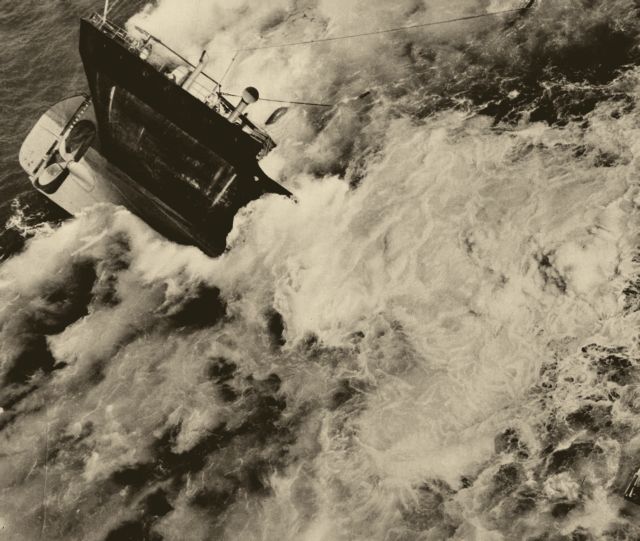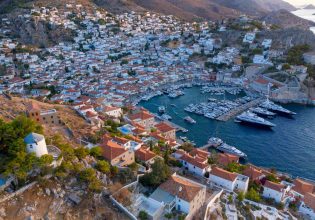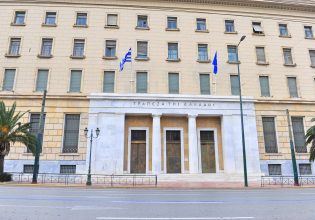
Hellenic Merchant Marine in World War II
By John Paloubis Vice Admiral (ret.) from the Hellenic Maritime Museum in Piraeus, Greece No one who has not travelled professionally at sea can imagine what a tough occupation being a sailor is in peacetime. Dreary and cruel, it keeps you far from family and loved ones. Sea voyages demand hard work; they require mettle and courage. The work itself […]
Spotlight
-

Αντιδράσεις για τη δήλωση Βασίλη Κασσελάκη για τις ψήφους των Σπαρτιατών – Τι απαντά
-

Barbra Streisand: Η μυθική καριέρα και οι μεγάλοι έρωτες της πολυβραβευμένης τραγουδίστριας
-

Κρατούμενοι έσκαψαν τούνελ σε φυλακή για να αποδράσουν αλλά έπεσαν σε αστυνομικούς
-

Πέντε συμβουλές που θα ενισχύσουν την έμφυτη νοημοσύνη του σκύλου σας
By John Paloubis
Vice Admiral (ret.) from the Hellenic Maritime Museum in Piraeus, Greece
No one who has not travelled professionally at sea can imagine what a tough occupation being a sailor is in peacetime. Dreary and cruel, it keeps you far from family and loved ones. Sea voyages demand hard work; they require mettle and courage. The work itself is physically tiring and soul-destroying, as the seaman becomes a cog in a dull routine that seems to last for ever: hours, days and months seeing the same things, doing the same jobs, washing the same bulkheads, scraping the same metal plate.When not on duty, between the watch bells, you travel along paths in your mind, usually back home to your favourite haunts, places and people. The interminable loneliness proves harder to bear than the work, than the watch. You have the feeling that your life is slipping away as you make your way along the same corridors, bump into the same people, read the letter from your mother or wife for the hundredth time, or monotonously listen on the Japanese
compact disc player to the latest CD sent to you, with its songs of yearning and heartbreak from the home country.
On your watch you must endure howling winds, rough seas, typhoons, dangerous currents, thick fog, but also periods of calm which are just as tiring, especially when you are completely surrounded by shiny blue horizons that resemble silk sheets, and your eyes are hurting from the light – intense, vast and boundless. Not to mention the monotonous throb of the engine, sometimes deafening and other times almost imperceptible because you are so used to it, but it is always there, inside you, like the beat of your heart; you can feel it in your veins like your very breath.
And suddenly war comes, making you appreciate just how pleasantly monotonous and tranquil, relaxing and desirable routine actually is. For in war there is no routine. The unexpected, the
unforeseen is never far away. Death is omnipresent. It comes from the air in just a few moments, it comes from the surface in the form of enemy raiders, it comes from beneath the surface in the form of torpedoes fired by unseen submarines, which head for the hulls of vessels like steel arrows and tear them apart, opening them up for death to enter. And just as you are approaching some port and are thinking that the voyage is over, death comes in the form of treacherous, murderous mines, floating just below the surface or resting on the bottom, in relatively shallow water, waiting patiently like ghouls, like metal monsters, instruments of death ready to explode and sink a ship with all hands.
In the hell that follows each hit, resembling scenes out of Dante’s Inferno, those who pass from life to death in the few seconds that it takes for the ship to sink may actually be the ‘lucky’ ones. For those ‘lucky’ enough to find themselves floating on the surface, grimly holding on to some plank, or even in a lifeboat or on a raft, soaked from head to foot in oil, must now contend with the freezing cold, the burning sun, sharks, enormous waves, hunger, thirst and being in the intimate company of death for a long period, sometimes for weeks on end. And this is assuming they have survived the usual strafing in a ‘performance’ put on for the benefit of the enemy crews. The 20th century was the bloodiest century in the history of mankind, for it hosted two world wars, in both of which our country participated.
It is an undisputed fact that countries at war need huge quantities of supplies of every type. The main categories are food supplies for the general population, raw materials, especially for the war
industry, and military supplies such as munitions, fuel, and spare parts; then there are long lists of hundreds of categories and thousands of different materials, from railroad cars and engines of every kind and capacity, to accessories for the uniforms of those doing the actual fighting, appropriate for the different climates and seasons in which the war is being conducted. These massive quantities of materials and supplies are what in the first place ensure the survival of the population in the rear –they maintain life, activity, industry, electricity supply in the cities, villages and provinces, thus keeping the people’s morale high and the country’s capacity to cope with the war effort at a satisfactory level.
In addition, the support staffs of the Armed Forces must manage the so-called Daily Supply Flow, which involves large concentrations of supplies and war materials that are despatched on a daily basis to the front line. These supplies include the fuel that allows tanks to move, aircraft to fly, ships to sail, artillery to fire, armies to fight and the war to be pursued. In the second great war of the 20th century, this vital chain of supply could be effectively maintained only by sea transport. Air communications were entirely inadequate from the point of view of transport capacity. Even today, after leaps and bounds in the development of air transport, a huge number of flights would be required to equal the transportation capacity of just one ship, and of course at an incomparably higher cost.
Thus, it was the merchant vessel that maintained this chain of logistics and supply, ferrying supplies mainly to England but also to all the other theatres of war: to Africa, the Mediterranean, northern Europe, the Indian Ocean, the Pacific, northern Russia etc. Moreover, it was the merchantman which took part in almost all largescale transportation of military units from one front to another, or in the major landing operations in North Africa, Sicily, Anzio, southern France and Normandy. It was the merchantman that saved thousands of lives by evacuating trapped units, as at Dunkirk and from Crete, and it was the merchant ship which broke the blockades and brought supplies to besieged garrisons, as at Tobruk. By way of conclusion, one could reasonably maintain that it was the merchantman which, sailing thousands of miles across the oceans and seas of the world, supplied the war effort and implemented the strategic troop movements and manoeuvres that had been planned on the military maps.
However, it must be stressed that the Merchant Marine is not a state service and its everyday operations are not controlled by the state. The fact is that while it does operate within the existing legal framework, it shows no uniformity of action, nor does it adhere to the common operations doctrine of the military service. Thus the change of operation from peacetime to war at a
completely unexpected time, as well as the results of merchantmen mission have to be evaluated with different criteria. The peacetime professional seamen are changed into warriors of
a war machine and are exposed to the same dangers as the military professionals, but without having the means for, or the special training for, self-defence. Within the special context of wartime
operation the participation and contribution of the Merchant Marine are unique, and have to be assessed according to their own assessment criteria.
World War II was one of the bloodiest and toughest wars in world history and lasted almost six years. It began in Central Europe and gradually spread throughout the world, drawing in the majority of the world’s nations. ‘Little’ Greece failed, despite its desperate efforts, to stay out of war and was coerced into taking part in October 1940 faced with the dilemma to voluntarily be
enslaved or to fight. The country fought, resisted, was occupied, managed to survive and at the end of the war found itself on the winning side. It paid a very heavy price in proportion to the extent of its input, but the reward at the end of the war was inversely proportional.
Much of the Greek contribution to the successful outcome of the Allied effort is attributed to the Greek Merchant Marine. It voluntarily sided with the Allies from the day the war was declared, despite its country not getting involved until a year later. This contribution came with a great many sacrifices. The purpose of this paper is to highlight these sacrifices and make known
the enormous achievements of the Greek Merchant Marine for the benefit of the country, global freedom and democracy..
World War II began on 1 September 1939 and ended with Japan’s surrender on 2 September 1945. In order to better examine the contribution and the sacrifices of the Greek
Merchant Marine in World War II we divide the time into four periods:
Period A: Greece neutral. 1 September 1939 until 28 October 1940;
Period B: Greece fighting. 28 October 1940 until 28 May 1941;
Period C: Greece occupied 28 May 1941 until the end of the war on 5
September 1945;
Period D: From the end of the war until the complete sweeping of the Greek
seas by mines, 5 September 1945 until 21 February 1954.
In September 1939 Greece had the ninth largest merchant marine in the world. The flags listed were as follows:
• United Kingdom
• USA
• Japan
• Norway
• Germany
• Italy
• The Netherlands
• France
• Greece
Quantitatively, Greek shipping in September 1939 was presented as follows:
Under a Hellenic flag 583 ships total
506 freighters
55 passenger ships
1 ocean liner
21 various others
1,878,403 GRT
Greek ships deployed in China 22 43,992 GRT
Under foreign flag 124 454,318 GRT
Motor sailing boats 713 55,057 GRT
Each was greater than 30 GRT.
The 22 Greek freighters and barges employed exclusively in the seas of China had been purchased gradually by Greek ship owners after the Sino-Japanese war and sailed under the Greek flag, registered in various Greek ports. Ships under a foreign flag working for Greek interests used various flags, but the most common was that of Panama. The declaration of war found the Greek freighters dispersed over all the seas of the world transporting goods and services on behalf of shippers with the ships heading for the various countries and ports of the world, including England.
The Greek ship owners knew long before the outbreak of World War II that they would side with the British in the event of war. Despite occasional differences, their long-time association with the British shipping industry, as well as the hospitality they traditionally enjoyed when doing business in London, the metropolis of world shipping, had resulted in the UK being their second home.
The declaration of war in September 1939 marked Greek shipping’s informal engagement, almost a year before Greece itself entered the war. This resulted in the loss of about 90 Greek steamers due to acts of war, during a period when the country was still neutral.
With the exception of 15 cargo ships chartered to the Swiss government before the outbreak of the War, the entire Greek merchant fleet fought and transported goods alongside the Allied forces during the war. With the outbreak of World War II, the British authorities attempted to charter a large number of Greek steamers. The offer was extremely low and, despite the pressure exerted having the advantage of controlling the insurance and bunker markets, was categorically rejected by the Greek side. In addition to the above, the Greek ambassador in London expressed his
strong objection to a proposal that also bore the risk of exposing the neutral status of Greece and consequently the chartering of almost half the Greek merchant fleet was avoided at the time. Greek ships continued operating in a fast rising free market until April 1940 when a deal was eventually reached where 150 vessels were chartered to the British over a period of six months.
The Germans were disturbed by the use of the Greek merchant ships for British transport during Greece’s formal neutrality, but only in August 1940 did they express their first reactions. A characteristic example can be found in one of the telegrams regarding the activity of the Greek Merchant Marine from the German Foreign Minister, von Ribbentrop dated 24 August 1940
to the German Ambassador in Athens and sent to the Greek government: “The fact that the maximum of Greek Merchant Marine is still used on behalf of England is perhaps the severest of our complaints against Greece. We expect that Greece immediately lift any obligation of Greek seamen travelling to the United Kingdom and also prohibit any voyage of ships flying a Hellenic Flag to British ports.
The best excuse of such acts, are the statements of Germany and Italy about the naval blockade. If, however, the Greek Government adheres to its original aspect, this may lead to dangers much severer for the general interests of Greece”
The Hellenic Merchant Marine paid a high price for its assistance to the common case of the Allies. Since the first day of the war the Greek freighters, although neutral, were torpedoed and bombed without hesitation.
Losses in period A4 were, in brief, as follows:
Losses due to the war 73 ships (of which 47 by submarine attack)
Confiscated 17 ships
Total 90 ships
The Italian attack against Greece on 28 October 1940 marked the entry of Greece into World War II. Greek cargo ships played a crucial role transporting about 4/5 of supplies and troops, bravely fighting on the Albanian front. At the same time, Greek merchant ships, in addition to the service they offered operating alongside the Allied forces, continued to serve the country’s supply requirements. With the outbreak of war, the Greek government took the following measures to protect the Greek Merchant Marine and to serve the war effort. The London radio station broadcast the following order: “At the behest of the Hellenic Government to freighters located in the Pacific those headed towards America should continue their voyage.
If they are sailing towards Asia they should change course and sail to a British or Dutch port or a port of the United States or one belonging to these countries. As for Greek freighters located in the
Atlantic, if they are headed west they should continue their voyage, and if they are sailing eastward they must head to British ports. Greek ships should not sail into French ports or ports of the French colonies.” The boats that heard the broadcast complied with the Greek government. Unfortunately there were freighters that were seized on the first day of the war because on the opening day of the war they were found in Italian ports or ports controlled by the French Vichy government, or were otherwise detained by the Germans.
In order to find capacity and transfer the necessary supplies to Greece from abroad the Imperative Law 2609/1940 was adopted providing authorisation to the Greek ambassador in London to undertake, requisition and charter Greek vessels using an advisory committee chaired by him. Through the Maritime Committee established in London, an agreement was made with the responsible British Ministry for the collective charter of the Greek ocean-going merchant fleet until the end of the war. At the same time the Anglo-Greek Allocation Subcommittee was established in order to ensure that the risks to which the Greek ships were exposed were similar to those of English ones, that charters of ships and also the number of these vessels would be left to the approval of the subcommittee. Free of the general charter, the following categories were allowed:
• The ships that were time chartered by the Swiss government. The Greek government paid the fare to the ship-owners in pounds whereas it was paid in dollars. This left a profit to meet the costs of the war.
• Various other classes of ships were designated to also collect fares on behalf of the Greek Government to address the government’s operating costs.
Additionally, Law 2669/1940 provided authorisation to the Minister of Merchant Marine to mobilise seafarers. Under this law a decree was issued mobilising the seafarers serving on vessels over 500 GRT as well as the unemployed in foreign ports. All were considered conscripted and remained in their positions, and those who abandoned them, or refused enlistment when required by the authorities, were declared deserters in wartime and punished under the provisions of the Military Criminal Code and the Disciplinary Code for Mariners. Following Italy’s defeat, Germany had no alternative but to occupy Greece with its own forces. On 6 April 1941, Germany invaded the country from the Greek-Bulgarian border and, thanks to their powerful air force, managed to move further south.
On 3 May 1941 in view of the final collapse of Greece to advancing Axis forces and the determination of the Hellenic government to redeploy to Egypt, where it would continue the fight until the end, Law 3009/1941 was issued according to which all ships, boats, and other floating craft under the Hellenic flag, and every ship owner, operator and crew member, were put under the control and jurisdiction of the lawful Hellenic government in exile. This law spared the Greek ships against possible hostile actions of the allies, who could otherwise find that ships were operating under the command of the occupying government installed in Greece. Among Germany’s first priorities following the occupation of Athens was to secure the control of Greek cargo steamers still in service. The Prime Minister of the government they installed delivered a letter to the Union of Greek Ship Owners on 5 May 1941, requesting all its members to convey to their ships the order that all vessels would be placed at the disposal of German forces. However, a few days before the occupation of Athens, the ship owners’ legal advisor had taken the initiative to burn all relevant files
that could link the ownership of ships to individuals.
This action did not stop the Germans who were eager to control the Greek fleet. Employing another tactic, they offered to acquire Greek ships with official memorandums of agreements, stating that under British control they were useless to the Greeks anyway. The offer was tempting as most ship owners would not have been able to support themselves with the funds. However, when they realised that by doing this the Germans would be able to demand delivery of all Greek ships calling in neutral ports, they pretended they were only managers and that the real owners were based
abroad. The Germans continued to press and threaten with imprisonment in order to achieve their purpose, but failed to break the owners’ resolve. The conqueror’s plan to take control of the Greek merchant fleet was permanently shelved.
During the Italian and German invasion, the transfers made in the Hellenic marine area and in the wider Eastern Mediterranean were particularly dense. The German phase was particularly devastating for Greek shipping and for most Greek passenger ships. The presence and effectiveness of the German air force was the sole cause of large losses. The Germans sent their
air force to destroy any watercraft by which British and Greek forces could escape to Crete and Egypt. Following successive air strikes, almost 120 Greek vessels, including the entire passenger fleet and five hospital ships were hit and sunk in Greek waters. Only four passenger vessels managed to survive escaping to the Middle East. Nevertheless, many other ships were able to escape while simultaneously providing valuable transportation for the benefit of the common Allied struggle. The contribution of merchant shipping during this phase was so important that the Chief of the British Mediterranean Fleet, Sir Andrew Cunningham in his day order on 11 May 1941 said:
“I wish to convey my satisfaction and my admiration for the work of the masters, the officers and crews of the Merchant Navy and allied merchant vessels which took part in the movement of the
Imperial forces to Greece and, in recent operations, when they were withdrawn. During the period of these operations under conditions of significant risk and difficulty, there was no hesitation in the decisive way in which ships counterattacked air raids with the defensive weapons. It was wonderful. We, the Royal Navy and men of the Imperial Forces, we understand the dimension of the above mentioned services and the debt owed to the Merchant Navy and its dedicated work of the past weeks.”
In summary, the situation of loss in this period was:
sunk by submarine action 21
sunk by air action 126
sunk by mines 6
sunk by surface raiders 5
sunk by an unknown cause 7
Total 65
The figures above do not include losses of motor sailing ships which at the end of this period were particularly important. The Hellenic losses of this period are in addition to the almost complete destruction of the flourishing Hellenic River shipping in the Danube. The scale of this is not exactly known, but it is known that it had many river ships, barges and tugs with many Greeks serving aboard. Following the accession of Romania to the Axis and occupation of Greece, those vessels were considered war booty and were seized by the German authorities. The occupation of Crete was completed on 28 May 28 1941. After that only the decks of Greek naval and merchant ships were considered Hellenic territory and so these formed the basis for the economic survival of the
Hellenic government in exile. Meanwhile, the remaining Greek ships were requisitioned by order of the official government of Greece. Formed under tragic circumstances with the support of the British when the German forces were approaching Athens, the government had eventually moved to Crete. Following the requisition order, all ships were placed under the control of the British
forces throughout the War, plus an additional six-month period after its end, according to the Anglo-Hellenic Agreement signed by the government.
It must be stated that throughout the War, ship owners acted as managers of their own ships, appointed by the Greek Maritime Commission set up in London under the control of the Greek ambassador. Their income was restricted to a monthly hiring fee, equal for all ships and covering basic operating costs, which were unfortunately constantly rising. This was due to excessive demands by seafarers, whose requests were readily met by the Greek government, residing at that time in Cairo. During this period, commercial shipping and the people who served it showed some positive and negative peculiarities. Merchant ships that survived, those which fled and those which found a way to get away from Greece, along with the remnants of the Armed Forces who were able to leave, formed the nucleus and the drive to continue the struggle against the occupier. Ships and sailors were uprooted. Their home had been enslaved by a conqueror which, during the early years at least, undoubtedly seemed dominant in all fields of battle. Liberation and the chance to return home seemed distant and unlikely.
The Greek ships sailed in all the seas of the globe, survived or were lost, with no one being aware of their fate. Seafarers may had been gone, but their families were in Greece and were hungry and suffering. The epic performance of Greek shipping in the War was unfortunately marked by several incidents created among seafarers following the fall of Greece in April 1941. This led many of them to the United Kingdom and especially to Cardiff where the Panhellenic Seamen’s Federation (ΠNO) first set up offices, followed two years later by the communist-controlled Organisation
of Greek Seamen’s Union (OENO). The latter, with the support of local leftist unions and under the tolerance of the Greek government in Cairo, managed to take control of the situation on board many Greek ships and put forward its views to many seafarers who were physically and mentally exhausted by the tragic conditions created by the war. Ships were constantly torpedoed at the time, while their seafarers were concerned about the fate of families and relatives back home since they were practically unable to arrange for money to be sent to them. At the same time, the government in exile was not able to address these serious issues. Many seafarers sunk into desperation and acted in a manner that disturbed order on ships, even reaching mutiny in a few cases.
Despite the fact that the entire Greek seafaring family demonstrated heroism and self-sacrifice throughout the War, such behaviour and excessive demands on seafarers led to unpleasant results. By the end of World War II, ships under a Greek flag had lost their competitive status as their operating expenses were only less than those of the fleet flying the US flag. On the other hand, the state of harmonious co-operation between owners and seafarers that had served as the cornerstone for the evolution of Greek shipping, was seriously shaken. Both the flag and the crew were Greek the ships chartered to the Swiss government were excluded from this British charter. At the beginning there were 13 of these ships, but as a result of British pressure there remained only
eight. Furthermore, another ten ships remained available to the Hellenic government abroad, benefitting from the difference between free and time chartering to cover operating costs.
The charter to the British Government meant Greek vessels were no longer free for transfers other than those determined by the British Ministry of Transport and, of course, time spent in port for repairs, or simply for the crew to rest, was minimal. Greek freighters could be found travelling in these circumstances on seas across the globe. They sailed the dangerous central and northern Atlantic routes, serving as the vital transport of supplies for England from the U.S in the years 1942–43. They took part in Russian supply convoys through the port of Murmansk, where chances of surviving a shipwreck at sea dwindled after just a few minutes.
They could be found on the British Army supply routes in Egypt, circum – navigating Africa, crossing the South Pacific and the Indian Oceans. They participated in the supply of Australia, China, Burma and India. In all these missions, in addition to from the dangers of the sea, not themselves negligible for the old and fatigued freighters, they had to face the dangers of war mainly in the form of German, Italian and Japanese raids and submarines. Often, due to low speed or because of malfunctions, they remained behind convoys. This caused the loss of a number of ships.
They served the needs of the Greek and British Navy providing support with ships that had escaped from the Germans during the taking of Greece, and those that managed to escape under the subsequent occupation. 300 motor sailboats are estimated to have escaped from Greece during the occupation, and to those can be added about 100 Greek-owned vessels which escaped from the Italian-occupied Dodecanese islands. These vessels provided a valuable service to free Greek Authorities using bases in Cyprus, Alexandria, Beirut and Smyrna. They were also used by the British for various missions in the Mediterranean and Aegean.
It is difficult to accurately pinpoint the losses of small motor sail boats given the difficult periods of total confusion during the occupation. The allied authorities had issued orders to cease communications between the islands and mainland Greece which was served almost exclusively with these small vessels, because these communications reached the occupied garrisons of the islands. Therefore, most losses are due to Allied action. The missions of these vessels included:
• Providing support services to the Hellenic Navy;
• Aiding the escape of people and agents from occupied Greece;
• Commando operations;
• General transportation;
• Serving the communication needs of the islands during the first
months following liberation.
Losses of Greek ships in the period that followed the occupation of Greece until the end of war can be summarised as follows:
• Ships sunk 8 182
• Motor sailboats sunk 9 483
• By Allied submarines 116
• By German submarines 1
• By Allied air force 166
• By German air force 78
• By mines 42
• By undetermined cause 80
The end of the war marked the beginning of a period of rebuilding in Europe. Trying to cope with the movement of people who had been displaced voluntarily or involuntarily, as well as the transport of suppliesto feed the people and rebuild the cities and villages meant an enormous strain on transport networks. The war, however, had left mines of all types scattered in the seas, laid
as part of the war for defensive or offensive purposes including magnetic, acoustic, percussive and anchored mines with the aim of prohibiting the enemy from crossing certain stretches of water. After the war the participants gave the co-ordinates of the minefields. Even so, many minefields were not exactly known and many mines had been cut from their anchor, or had drifted away and were a deadly threat to passing ships. Naval minesweepers immediately began the arduous task of clearing the seas. This long process claimed victims among both operating minesweepers and merchant ships. Even after the war 20 Greek merchant ships were lost to mines.
There were 583 Greek-flagged merchant vessels of all kinds in 1939 with an approximate total capacity of 1.8 million tonnes. At the end of the war in 1945, 126 ships remained with a total capacity of about 0.5 million tonnes. In other words, 78 per cent of the ships were lost equating to 72 per cent capacity. Of the fleet of small motor sailing boats, 483 were lost, or 68 per cent of their total number. The Greek Merchant Marine had 20,000 seafarers distributed aboard Greek-owned ships with a Greek or foreign flag, on foreign-owned vessels, and aboard many small sailing, fishing and motor boats. The latter were pushed hard on the Greek seas during the hostile occupation as they were the main means of communication between the islands and the mainland country.
Existing evidence from different sources used to attempt to accurately determine the number of the Greek sailors lost during World War II is contradictory in many cases with regards to the actual figures and/or names of those lost. The best and most conservative approach presents the following categories of lost seamen:
Losses of Greek seamen on ships under Greek flag 1,547
Losses of Greek seamen on ships under foreign flag 152
Deceased abroad due to war-related causes 202
Deceased abroad due to unknown causes 27
Losses of Greek seamen on small motor boats 315
Losses of Greek seamen due to mines after the war 63
Total 2,306
Losses of non-Greek crew on ships under a Greek flag 431 (from 42 countries) and materials
While Greece was paying its own toll in blood in the Allied war effort, other countries enjoyed the guilty silence of neutrality, even collaborating with the Axis powers, as the collaboration served their own economic interests. Nazi Germany during the war purchased:
• Manganese for the barrels of cannons and weapons from Spain.
• Tungsten for the aerospace industry from Portugal.
• Iron ore from Sweden.
• Oil from Romania.
• Diamonds for machines and tools for industry to support the war
from South America.
These raw materials were purchased through Swiss mediation. Switzerland, apart from their own high quality arms exports to the Third Reich, also facilitated international trade for the Germans.
Finally, there is the case of Turkey. Turkey attested its neutrality, but provided Germany with massive exports of chrome ore, the raw material required for bearings and casings of shells. It also sent Greeks arrested by border guards while trying to escape to Turkey by boat, or even by swimming, intending to reach the free Middle East. These captives were returned to Germany almost certainly to be executed at the hands of the Nazis. Only towards the end of the war, and once the scales of victory had tilted towards the Allies, did Turkey join the Allies, with the aim of restoring
its position in the world.
Greek society has never been officially informed about the enormous, unprecedented contribution of its Merchant Navy to the national effort to achieve the major aspirations that followed World War II in the midtwentieth century. It never learned about the disproportionately high – for the size of the country – sacrifice in lives and resources, one that remains unrecognised, and never properly appreciated at the table of winners. Immediately after the war, the expediencies of the major powers at the time and the cold realism which prevailed in international relations took
the place of the hymns and praise for Greek contributions to the common Allied cause, and all hopes of national integration through the liberation of enslaved areas of the nation once again remained unfulfilled.
This collective forgetfulness and ignorance may have been exacerbated by the national tragedy of the bloody civil war that followed World War II. Then again, it may be that the dignity of our seamen prevented them from actively seeking publicity and exploiting their contribution. The modesty which characterised them meant they kept their sacrifice far from any such vulgar display. A handful of their close relatives in maritime areas of the country have kept a few precious mementoes, along with several yellowing photographs, to remind the younger generations of their loved ones who lie at the bottom of the sea all over the world. Only they remember, together with several elderly survivors, many of whom suffer from mental illness or social disorders, and unable to care for themselves, victims of the mental collapse caused by their shipwrecks, to become wrecks themselves.
A cement cross that looks out over the sea in a corner of the Peiraiki pen- insula stands as the only sign of a faint national memory, a last bastion against total amnesia, in commemoration of those who: “have departed life forever, without a kiss, without a tear, without a companion, without burial garments, in fact without a burial, far from their homeland and loved ones”.
Endnotes
1. Los 1998: 27.
2. Dounis 2003: 24.
3. Paizis 2004: 17.
4. Hellenic Merchant Marine Losses during World War II, 1991: 5.
5. Paizis 2004: 19.
6. Paizis 2004: 23.
7. Hellenic Merchant Marine Losses during World War II, 1991: 13.
8. Hellenic Merchant Marine Losses during World War II, 1991: 19.
9. Babouris 1949: 42.
10. Paizis 2004: 120.
11. Hellenic Merchant Marine Losses during World War II, 1991: preface.
12. Paizis 2004: 127.
13. Los 1998: 18.
14. Los 1998: 18
Ακολουθήστε το in.gr στο Google News και μάθετε πρώτοι όλες τις ειδήσεις










































 Αριθμός Πιστοποίησης Μ.Η.Τ.232442
Αριθμός Πιστοποίησης Μ.Η.Τ.232442